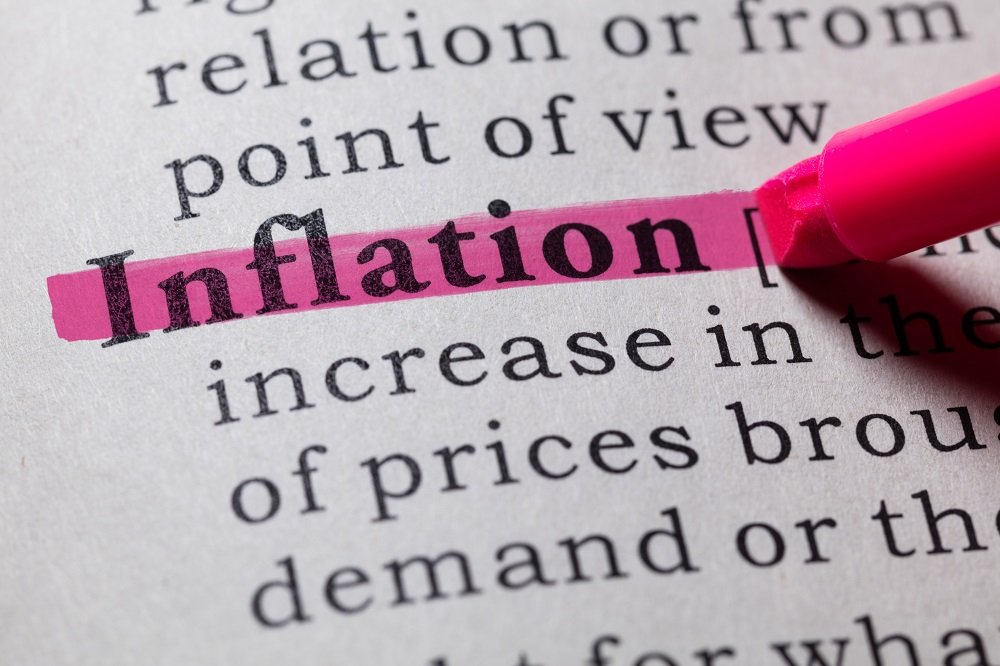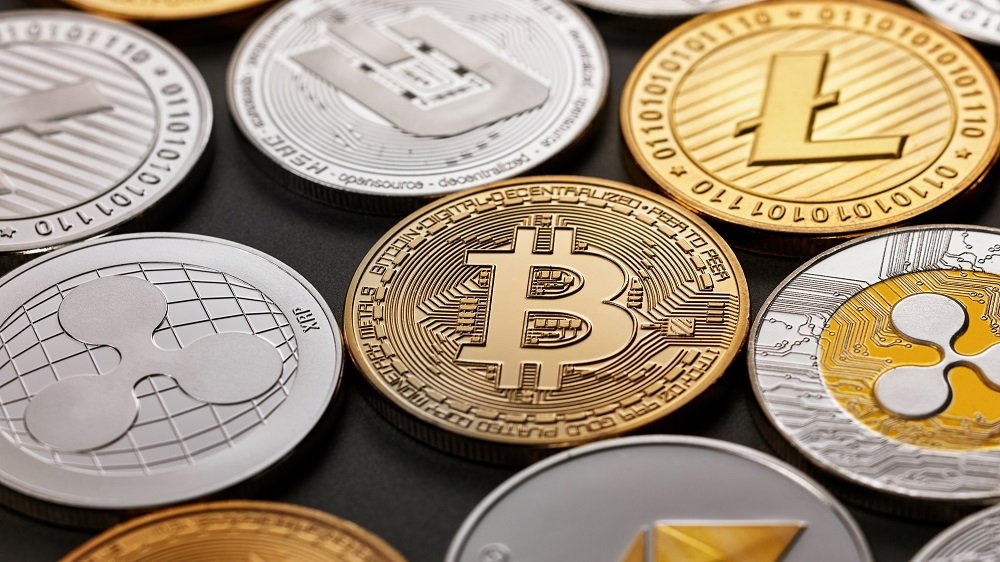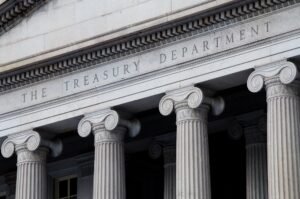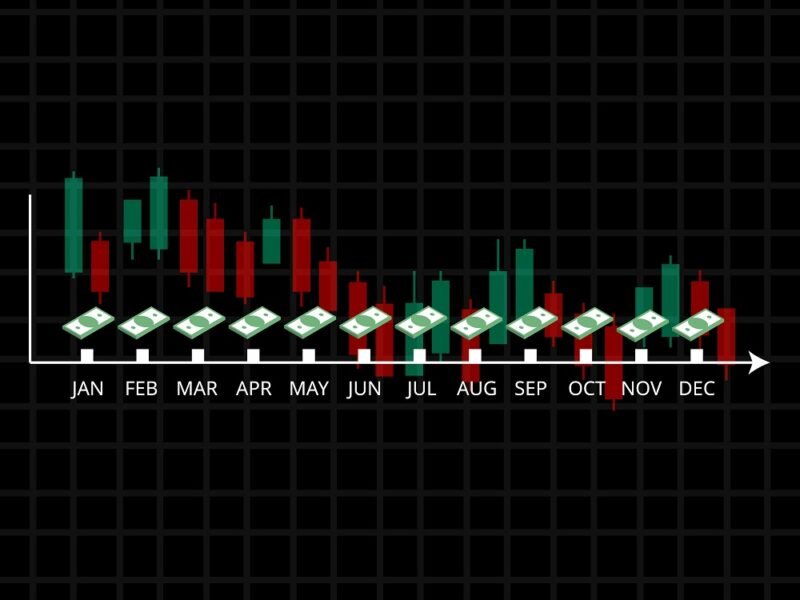Protect Yourself from Inflation

Table of Contents
 Periodically, and particularly over the last several months, inflation has been the key button phrase rattling markets and politicians alike. Inflation, or the devaluing of a currency over time, leads to an increase in prices across the board. Price hikes caused by inflation can be seen at the gas pump and the grocery store.
Periodically, and particularly over the last several months, inflation has been the key button phrase rattling markets and politicians alike. Inflation, or the devaluing of a currency over time, leads to an increase in prices across the board. Price hikes caused by inflation can be seen at the gas pump and the grocery store.
Additionally, goods aren’t the only thing that experience inflation… so do services.
Since services require labor, and individuals working to provide the labor need to eat and pay for goods themselves, necessary wage inflation can also impact the broader economy. The occurrence of inflation can be self-perpetuating.
But what can you do about inflation? Is there anyway to protect the money that we have now to ensure that it isn’t devalued along with everything else? The answer to these questions is far from certain, however, some experts do have a few recommendations.
In this article, I’ll cover several methods to try and get ahead of inflation as referenced by other market prognosticators.
I should say up front that no one can predict the future, and some of these methods of supposedly protecting against inflation may leave you exposed to other market tendencies… so diversify! Never throw all your eggs into the same basket. After all, what if inflation stops suddenly or reverses?
Buy Gold
Many folks will regurgitate the advice to buy gold when confronted with inflation. Gold is often espoused to be a ‘store of value.’ Much of this talk about gold maintaining its value has to do with the perception that the amount of gold available and already mined stays relatively constant.
Thus, if the amount of supply of a commodity remains constant, then the value should also remain constant. If inflation goes up, theoretically the price of the asset will go up along with it so that the underlying value stays steady in terms of purchasing power.
In fact, gold used to back the United States Dollar. In 1971, however, President Richard Nixon signed a bill that removed that backing. Since then, many ‘goldbugs,’ have predicted a return to the use of gold after some sort of catastrophic market implosion… suffice it to say none of this has happened… although YouTube is filled with this craziness.
So, is gold a good hedge against inflation? According to an article by CNBC the answer is probably a ‘no.’
While the jury is still out on the predictability of gold during high inflationary periods, one thing is definitely for certain: buying physical bars of gold is just ridiculous. The storage, handling and verification of precious metals costs an incredible amount of money over time.
If you decide to buy gold, think about using an Exchange Traded Fund (ETF) such as GLD or buy the stock of a reputable gold miner such as Barrick Gold Corporation, a Canadian Gold miner who once counted Warren Buffet’s Berkshire Hathaway as an investor.
Buy Cryptocurrencies

In the same vein as gold, certain types of crypto are often considered a ‘store of value,’ and thus a possible hedge against inflation. Among the numerous cryptocurrencies out there, Bitcoin is the one that folks most look towards to increase in value as inflation ticks up.
There are 2 main reasons that I believe that many consider Bitcoin a ‘store of value.’
- There are only 21,000,000 Bitcoins that can ever be mined. Thus, like gold, the supply of the asset appears to be limited. The market cannot be flooded with new coins to meet demand… thus as more buyers enter the market the price will theoretically continually go up.
- Early ’investors,’ or more appropriately, ‘speculators,’ in Bitcoin made the association of the new cryptocurrency analogous to gold. This equivalency may or may not be real… but the perception has been promulgated by so many people at this point that it has stuck to some degree.
So, is Bitcoin a good hedge against inflation?
I have no idea… and neither does anyone else! Bitcoin was only invented in 2008. Gold has been around since the dawn of civilization. If gold’s relationship with inflation is murky at best how could any association with a newly invented class of technology / currency / store of value possibly be made?
One thing is for sure, however, and that is Bitcoin has largely just increased in value during its short-lived existence. Whether this is an indicator that it could be used as a hedge against inflationary pressures, is just in the middle of a massive speculative bubble, or something else entirely is still up for debate.
There is no problem putting a small part of your portfolio towards crypto. If you decide to invest in Bitcoin, don’t do it because it will aid in some type of inflation play… it is better to throw Bitcoin into the ‘speculation,’ part of your portfolio as its price movements are not well understood.
Invest in Real Estate
Investing in real estate is often seen as a time tested and reliable hedge against inflation. Like gold and Bitcoin, there is a limited supply of land. As the population of the country goes up, the amount of land stays the same.
Thus, land is scarce. If the real estate in question has a home or other structure on it, the price is often substantially more, however whether the structures are properly maintained or not can cause a decline in value.
Getting more to the point: if you own a home the value has likely gone up over time and has probably at least increased with the rate of inflation. The longer period you own a property the more likely it is that this is true. There are many cases, like any home within 50 miles of Detroit, where this is also not true at all.
So, is Real Estate a good investment to protect against inflation?
The answer depends. If you are willing to hold onto a property for a long period of time, then the answer is ‘yes.’ If you are looking to temporarily get through an inflationary period by holding a real estate asset then you may be crossing into speculative territory.
The costs associated with buying and selling real estate can often be around 10% of the property. This means that any type of transaction would mean needing the property to go up in price 10%, plus the rate of inflation, plus any taxes… and that’s just to break even!
However, if you are looking to sink some money into property that you plan to rent out or use for your own purposes you can likely count on the underlying property keeping up in value with inflationary pressures.
TIPS
 Treasury Inflation-Protected Securities, also known simply as ‘TIPS,’ are often used to hedge against inflation. TIPS are issued by the United States Treasury, in fact you can find information on TIPS directly from the government sponsored website here.
Treasury Inflation-Protected Securities, also known simply as ‘TIPS,’ are often used to hedge against inflation. TIPS are issued by the United States Treasury, in fact you can find information on TIPS directly from the government sponsored website here.
Treasuries in general are low return investments.
If you have a chunk of money earning a low return, it could be relatively easy for inflation to make the investment worth less over time. For example, if you owned a Treasury that returned 1% interest, and inflation clocked in at 3% then you’re buying power would be eroded by 2% over a single year.
TIPS counteract this. At maturity, the Treasury will return at least as much inflation as measured by the Consumer Price Index (CPI).
So, does investing in TIPS actually work if you are trying to hedge against inflation?
The answer is a resounding, ‘yes.’ By definition, these assets will make sure that your spending power remains intact. One very important thing to keep in mind, however, is that while you are invested in a TIPS you may find that you could have gotten a non-inflation guaranteed return that substantially returned more money elsewhere.
If you are looking for security from inflation and you aren’t worried about missing out on other potential returns, then investing a portion of your portfolio (remember to be diversified) into TIPS could be a smart move.
Invest in Fine Art

In all the proceeding proposed methodologies to consider using to combat inflation, the idea of the asset being limited or ‘scarce’ has been a key tenant. Taking this idea to the extreme, what could be scarcer than a unique work of art?
That is the idea behind investing in fine art. Billionaires and hedge funds alike have invested in fine art over the years. Auction houses routinely make headlines about the amount of money works of art go for… and the amounts keep rising… sometimes substantially.
But is investing Fine Art something that the average investor can participate in to help lower the risk of inflation eating into our returns?
As crazy as it sounds the answer to this one is a ‘yes.’ Masterworks.io, a relatively new entrant to the fine art investing world, allows you to invest in unique and valuable pieces of art. It allows the average person to do this buy divvying up small pieces of ownership.
Traditionally, buying art requires many things to occur. It requires security, verification of validity, environmental controls, and the commissioning of an auction house to transact the artwork among other headaches.
Historically, investing in fine art, although apparently recession proof, has been too difficult for the average person to engage in practically. But in the modern era that is no longer the case.
But be careful!
With the ability to now buy fine art at the individual level, risks of the valuations moving up and down just like other assets goes up. The more things like art are securitized the more likely it will behave like securities and not art… so once again, fine art may be a good investment in moderation.
Summary
I’ve covered several ways that it may be possible to hedge against inflation. Gold and Bitcoin promise to beat inflation by offering something fiat currency can’t: scarcity. TIPS have the backing of the federal government but tie up your money into a low return investment. Finally, fine art is now investible in a securitized fashion.
Whichever way you decide to hedge against inflation, consider that doing nothing at all may be the best approach. No one can predict the future… the Federal Reserve has an entire wing of the government attempting to predict inflation and has largely failed at it during its entire existence.
Developing a diversified portfolio that is agnostic to specific market predictions is likely the best way to hedge against everything… including inflation.
Do Your Research
I write this blog as a source of entertainment and the views expressed are solely my opinion. When making investment decisions about your money you should seriously consider hiring a professional such as a Financial Planner or an Investment Expert.
I hope you enjoyed this article. If you have any other ideas that other readers should consider when thinking about inflation throw them down in the comments below.
Guy Money
As a formally trained Data Scientist I find excitement in writing about Personal Finance and how to view it through a lens filtered by data. I am excited about helping others build financial moats while at the same time helping to make the world a more livable and friendly place.



